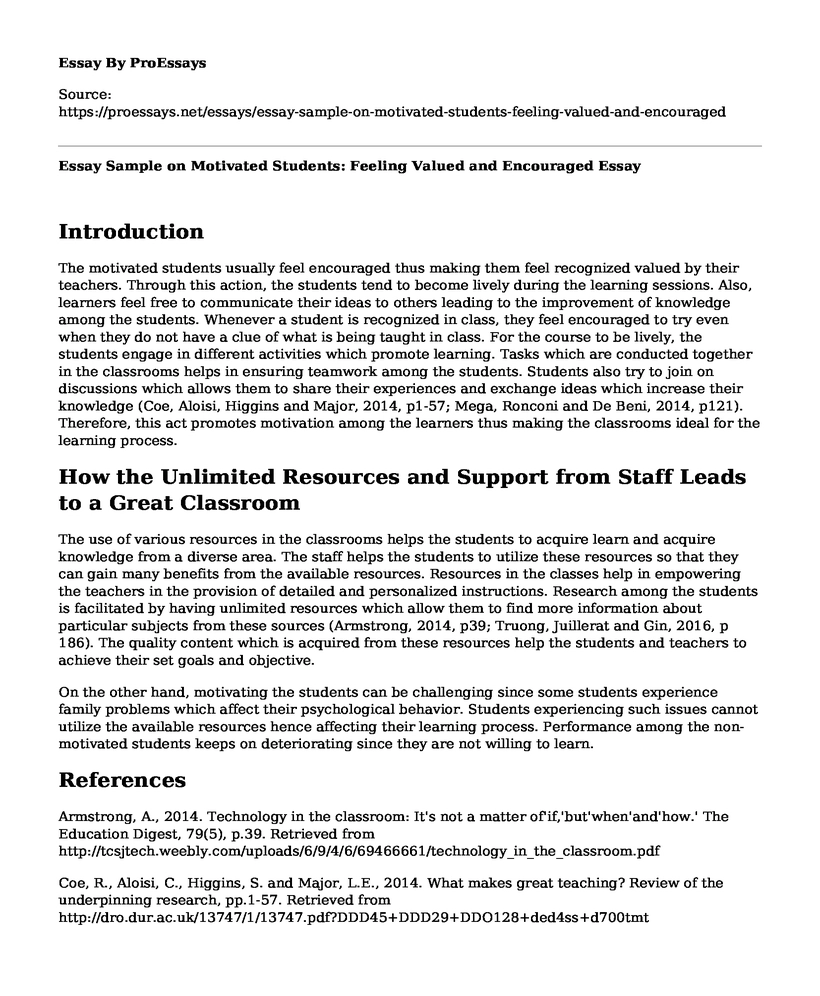Introduction
The motivated students usually feel encouraged thus making them feel recognized valued by their teachers. Through this action, the students tend to become lively during the learning sessions. Also, learners feel free to communicate their ideas to others leading to the improvement of knowledge among the students. Whenever a student is recognized in class, they feel encouraged to try even when they do not have a clue of what is being taught in class. For the course to be lively, the students engage in different activities which promote learning. Tasks which are conducted together in the classrooms helps in ensuring teamwork among the students. Students also try to join on discussions which allows them to share their experiences and exchange ideas which increase their knowledge (Coe, Aloisi, Higgins and Major, 2014, p1-57; Mega, Ronconi and De Beni, 2014, p121). Therefore, this act promotes motivation among the learners thus making the classrooms ideal for the learning process.
How the Unlimited Resources and Support from Staff Leads to a Great Classroom
The use of various resources in the classrooms helps the students to acquire learn and acquire knowledge from a diverse area. The staff helps the students to utilize these resources so that they can gain many benefits from the available resources. Resources in the classes help in empowering the teachers in the provision of detailed and personalized instructions. Research among the students is facilitated by having unlimited resources which allow them to find more information about particular subjects from these sources (Armstrong, 2014, p39; Truong, Juillerat and Gin, 2016, p 186). The quality content which is acquired from these resources help the students and teachers to achieve their set goals and objective.
On the other hand, motivating the students can be challenging since some students experience family problems which affect their psychological behavior. Students experiencing such issues cannot utilize the available resources hence affecting their learning process. Performance among the non-motivated students keeps on deteriorating since they are not willing to learn.
References
Armstrong, A., 2014. Technology in the classroom: It's not a matter of'if,'but'when'and'how.' The Education Digest, 79(5), p.39. Retrieved from http://tcsjtech.weebly.com/uploads/6/9/4/6/69466661/technology_in_the_classroom.pdf
Coe, R., Aloisi, C., Higgins, S. and Major, L.E., 2014. What makes great teaching? Review of the underpinning research, pp.1-57. Retrieved from http://dro.dur.ac.uk/13747/1/13747.pdf?DDD45+DDD29+DDO128+ded4ss+d700tmt
Mega, C., Ronconi, L. and De Beni, R., 2014. What makes a good student? How emotions, self-regulated learning, and motivation contribute to academic achievement. Journal of educational psychology, 106(1), p.121. Retrieved from https://www.researchgate.net/publication/263916847_What_Makes_a_Good_Student_How_Emotions_Self-Regulated_Learning_and_Motivation_Contribute_to_Academic_Achievement
Truong, M.H., Juillerat, S. and Gin, D.H., 2016. Good, fast, cheap: How centers of teaching and learning can capitalize in today's resourceconstrained context. To Improve the Academy, 35(1), pp.180-195. Retrieved from https://files.eric.ed.gov/fulltext/EJ1163625.pdf
Cite this page
Essay Sample on Motivated Students: Feeling Valued and Encouraged. (2022, Dec 29). Retrieved from https://proessays.net/essays/essay-sample-on-motivated-students-feeling-valued-and-encouraged
If you are the original author of this essay and no longer wish to have it published on the ProEssays website, please click below to request its removal:
- American University in Cairo: Admission Letter
- The Importance of Soft Skills - Essay Example
- Career Choice Evaluation: IT, Cyber Security, Enviornmetal Scientist
- Rhetorical Analysis of Bergeron and Martin's Article
- Focus Child Case Analysis Paper Example
- Essay Example on Maximizing Performance to Achieve Excellence & Profits in Organizations
- Machine Learning: Evolution, Objectives, and Applications in Material Discovery - Research Paper Sample







